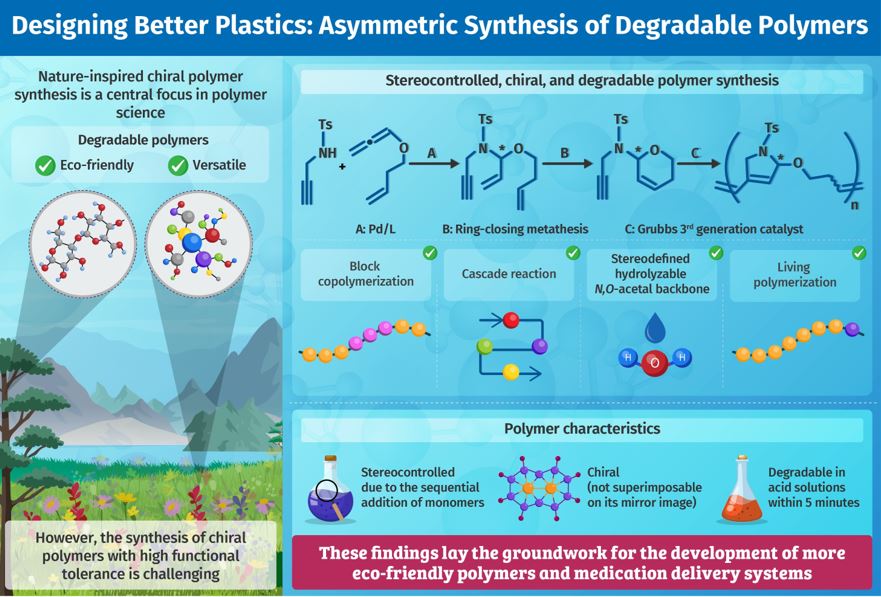
| Chungbuk National University Researchers Develop Nature-Inspired Degradable Polymers | |||||||
| Writer | 관리자 | ||||||
|---|---|---|---|---|---|---|---|

Image title: The synthesis of degradable polymers inspired by nature. Image caption: Scientists have created degradable polymers with directional attributes, using the method of living cascade enyne metathesis polymerization. Image credit: The authors License type: Original Content Usage restrictions: Cannot be reused without permission
With global concerns over plastic waste on the rise, researchers in polymer science have been looking to nature to design eco-friendly, degradable polymers with suitable directional properties. A team of scientists have now developed a new method for the synthesis of degradable polymers that have precise spatial characteristics and are eco-friendly. These polymers have properties that make them suitable for applications in advanced drug delivery systems, and biodegradable materials research. Increasing global concern over plastic waste and pollution has prompted the exploration of various methods to address this issue. Among these, degradable polymers have emerged as a green and versatile alternative to non-degradable plastics. These degradable polymers are often found in nature and exhibit “chiral” (directional) properties, such as those within DNA and peptides, and are now a focal point in polymer science research. The chirality and arrangement characteristics of polymers are defined as “stereochemical” and directly impact the properties of molecules. However, the production of chiral monomers, which are the fundamental building blocks of these polymers, is challenging as existing methods typically yield only one of two enantiomers (mirror-image pairs of molecules). Now, in a recent study, Prof. Cheoljae Kim and Bonwoo Koo of Chungbuk National University have developed a new eco-friendly polymer using optically pure degradable monomers. Their study was made available online in Angewandte Chemie International Edition on September 22, 2023 and was published in Volume 62 Issue 46 of the journal on November 13, 2023, Notably, the polymers produced showed "stereocontrol”, where the spatial relationships within a molecule can be changed as desired. According to Prof. Kim, “By regulating the feed of the stereodefined monomer, the resultant polymer can be designed to have either identical or mixed stereocenters, which cannot be achieved otherwise.” The study authors used a multistep synthesis to create the polymer structures. For this, ‘enyne’ monomers with a very well-defined stereochemistry were first synthesized. They contained special units containing carbon, nitrogen and oxygen atoms (denoted as N,O-acetals). The monomers were prepared using a reaction catalyzed by the chiral palladium (asymmetric hydroamination) followed by the closing of the molecular rings thus formed (ring-closing metathesis). Once these monomers were prepared, their non-degradable and degradable components, and their mirror-image pairs were placed sequentially to create “block copolymers”. These blocks were further treated with a ‘Grubb’s Third Generation’ catalyst to give rise to the final polymer. This synthesis is termed a living cascade enyne metathesis polymerization reaction.
Owing to the presence of both degradable and non-degradable monomers, the resulting polymer is degradable which is a huge advantage in terms of carbon footprint. The ability of the monomers to break down is attributed to the acetal backbone, which was fully degraded within 5 minutes in an acid solution. These properties make this polymer suitable for various applications such as the production of eco-friendly and medical materials, the generation of circularly polarized light, enantiomer separation, and asymmetric synthesis. “Our polymers take use of degradable and chiral polymers and can be used in improved drug delivery systems. Moreover, drug-selectivity is influenced by stereochemical characteristics, and degradability is required for controlled drug release,” Prof Kim emphasizes.
In summary, drawing inspiration from nature, the authors of this study have developed a stereocontrolled and degradable polymer using the living cascade enyne metathesis polymerization. This is a distinct achievement, given that conventional asymmetric polymerization for chiral molecules and block copolymer synthesis cannot produce these polymers. As a result, this development is expected to influence the fields of chiral resolution and asymmetric catalysis and find diverse applications in the medical and material domains. Moreover, it represents a significant step towards the creation of alternatives to non-degradable plastics.
Reference
About the institute Chungbuk National University (CBNU) is one of the ten Flagship Korean National Universities, a term for institutions in South Korea united under the "Presidential Council of the Korean Flagship National Universities." Since its establishment on September 27, 1951, Chungbuk National University has grown to include 13 Colleges and 8 Graduate Schools. In 1999, CBNU achieved recognition as part of the Brain Korea 21 Initiative by the Ministry of Education. Additionally, in 2003, the university was honored as the top institution in the project fostering regional universities by the Ministry.
Website: https://www.cbnu.ac.kr/site/english/sub.do?key=1427
About the author Cheoljae Kim is an Associate Professor of Chemistry at Chungbuk National University. In 2014, Cheoljae received a Ph.D. in Organic Chemistry from POSTECH (advisor: Prof. Young Ho Rhee). He has served as a postdoctoral scholar in Prof. Quentin Michaudel’s group at Texas A&M University and in Prof. Hoyong Chung’s group at Florida State University. His research group operates as a synthetic organic chemistry lab, focusing on the interface of organic and polymer synthesis. Currently, the group is conducting research on the synthesis of functional polymers using organic synthetic methods.
|
|||||||
| Attachments | |||||||